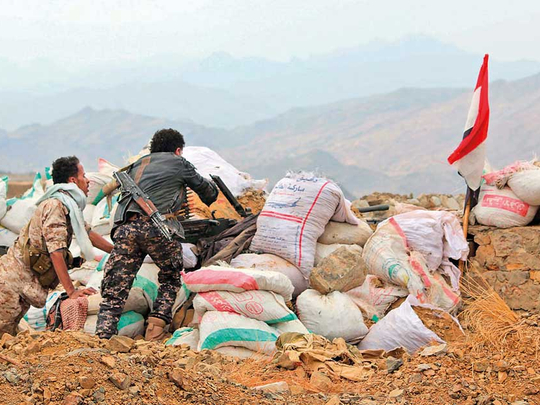
Al Mukalla: More than four Al Houthi field commanders have been killed in clashes with government forces and in bombardment by fighter jets from the Saudi-led coalition. Al Houthis recently mourned the death of Major General Naji Mohammad Al Arashi, the commander of Brigade 201 in the southern province of Taiz, and the commander of Lahj’s Karash front. Al Arashi, another senior military officer and several militants were killed in fierce clashes with government forces in Salo region in Taiz. Several other commanders have been killed in the northern city of Medi, another important frontline.
Since the Saudi-led coalition intervened militarily in Yemen in March 2015, dozens of field commanders loyal to Al Houthis and ousted president Ali Abdullah have been killed or captured on many fronts, in addition to the deaths of thousands of their fighters.
But despite the growing Al Houthi losses, government forces battling the militia along the rugged mountains of Nehim, just outside of Al Houthi-held Sana’a, Medi, Shabwa and Marib, have not been able to score significant military victories for the last several months.
Military experts believe the internationally-recognised government shares the blame for the military stalemate. Thousands of government troops equipped with modern arms have amassed in the central province of Marib. Despite receiving generous military support and air cover from the Saudi-led coalition, they have not engaged in fighting.
Brigadiers General Saleh Thabet, a military analyst, told Gulf News that the rebel forces derive part of their strength from the legitimate government’s failures and it reluctance to win the battle outside Sana’a. “The government must cleanse itself of the corrupt and the defeatists,” Thabet said. The other driving force behind Al Houthi resistance is the flow of Iranian arms through Yemen’s vast and porous coastline. These arms have replaced Al Houthis’ ageing arsenal and enabled them to continue fighting.
In Saudi Arabia, Ebrahim Al Marie, a Saudi colonel and a security analyst, said that forces loyal to the government should make use of the generous military assistance from the Saudi-led coalition and focus their efforts on liberating Sana’a from Al Houthis. “The Yemeni army should not wait for the coalition countries to carry out military operations on its behalf as it is fully capable of doing so,” he said on his official Twitter feed, referring to a military operation to oust Al Houthis from Sana’a. With the Saudi-led coalition support, Al Marie said, the Yemeni army is now more powerful than Al Houthis and Saleh’s militias, and it should have taken the initiative and made big advances.












